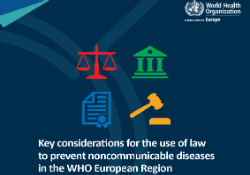New report highlights key considerations for the use of law to prevent noncommunicable diseases (NCDs) in the Region

The WHO Global action plan for the prevention and control of noncommunicable diseases 2013–2020, endorsed by the Sixty-sixth World Health Assembly in May 2013, recognizes the importance of considering trade measures, taxes and subsidies, appropriate packaging and labelling standards, and marketing restrictions, among other policy options. Such commitments are also reflected in relevant European regional strategies and action plans. Many of these policies will require legal approaches; however, in many Member States of the WHO European Region, capacity in public health to develop and implement such laws and regulations may be limited.
In order to support Member States in understanding and overcoming challenges related to the design and implementation of such laws and regulations, WHO/Europe convened an intensive legal training course for Member State representatives in 2016 in Moscow, Russian Federation. The course was jointly organized with the McCabe Centre for Law and Cancer, the I.M. Sechenov First Moscow State Medical University, and the Law and NCD Unit at the University of Liverpool, United Kingdom.
The training was designed to bring together public health policy-makers, government lawyers and representatives of trade and/or the economy as relevant stakeholders. The focus of the course was on regulatory options to address tobacco use, alcohol consumption, unhealthy diets and obesity. Through lectures and workshops, participants discussed the use of national powers for law-making, as well as some important considerations for the design and use of law in the context of existing international and regional health, trade and investment instruments and processes, such as obligations under World Trade Organization rules and the Eurasian Economic Union.
A new report entitled “Key considerations for the use of law to prevent noncommunicable diseases in the WHO European Region” captures the discussions from the training and provides general reflections on the use of law to prevent NCDs in the Region. It acts as a primer to demonstrate that NCD risk factors can be addressed though law.
In the Region, many laws for NCD control and prevention have already been implemented, notably in the area of tobacco control. More and more countries are rightly moving towards the use of law to prevent NCDs in other areas as well, such as alcohol and food. Nevertheless, Member States still face a number of challenges when it comes to designing and framing the objectives of laws; in some cases, laws may be challenged at national or international levels on the grounds of a perceived lack of evidence, or with claims that the law is disproportionate to its aims and/or contravenes trade and foreign investment commitments.
WHO considers the use of law to be a powerful policy tool for the prevention and control of NCDs. Notably, the introduction of appropriate legislation is central to achieving the vision of a tobacco-free Europe, reducing the harmful use of alcohol and promoting healthy diets. As such, WHO continues to recommend the use of law to reduce NCD risk factors, and recognizes the importance of developing legal capacity at the national level. This report highlights some of the important themes to emerge from the training, many of which will be integrated in WHO’s work with countries in the coming years.
The training and the publication of this report would not have been possible without the financial support of the Ministry of Health of the Russian Federation.



